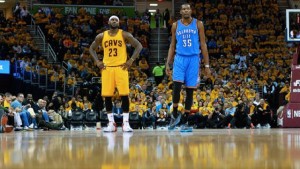
Kevin Durant and the Thunder kept close but let LeBron James and the Cavs slip by.
CLEVELAND — Kevin Durant was in the middle of answering the question, then stopped to pull a crumpled-up box score out from under his chair.
“Twelve,” he said. “That’s the game. They made 12 3s.”
Durant crossed his arms and leaned back in his chair.
“They made 3s and they got offensive rebounds,” he said. “That’s the name of the game.”
Sure, it was an oversimplification of the Cleveland Cavaliers’ 104-100 victory on Thursday over the Thunder that snapped Oklahoma City’s six-game winning streak. But it certainly was true.
The Thunder entered having held each of their previous seven opponents under 100 points, one game shy of an OKC-era franchise record. They gave up 16 offensive rebounds. They allowed the 12 3-pointers. Second-chance opportunities, defensive lapses and poor communication led to the Cavs scoring 30 in the fourth quarter to close it out.
Still, the Thunder, as they often do with two offensive savants like Durant and Russell Westbrook, managed to wiggle back to within three points with 22.5 seconds left, with possession of the ball. With eight seconds left, Durant shot a well-contested 3 that missed long. The Cavs fumbled the ball out of bounds as a panicked Tristan Thompson hurriedly tried to hand the ball to LeBron James. Billy Donovan called another timeout, and the Thunder ended up with a straightaway Westbrook 3, again well contested.
“The first shot, we wanted a better one, but we live with that,” Westbrook said. “And the second one, we live with it too.”
They also died on them, at least tonight.
It’s the gray area the Thunder operate within during those clutch-time moments, where they clearly want one of their two superstars to get the shot, while also trying to trust the pass and the open man. What’s better: an open Kyle Singler 3 or a contested 3 from Durant? This is the classic crunch-time conundrum for the Thunder. As Durant likes to report, it’s a make-or-miss league. He makes big shots as much as any player in the league, and amazingly, the ball going in has a way of making any half-court execution look exponentially better.
But there’s a certain predictability to what the Thunder do, particularly in those spots. Once the initial action to get the ball to Durant was read by the Cavs and blown up by a little physicality and a subtle grab of the arm, the Thunder’s next plan was for Westbrook to go get the ball and try to dance at the top of the key to get enough space to get another shot off. Except LeBron knew exactly what Westbrook was trying to do.
“I didn’t want to foul him,” James said. “I’ve learned from history, from watching a lot of games, Westbrook tends to get those calls late in games. He kind of flails his feet out sometimes, and I didn’t even want to put myself in position where the referee could make a call.”
It’s easy to focus on those final two plays, but there is no question that other segments of the game were more impactful, like the ones Durant listed above or the 18-0 run the Cavs had in the first half or their 16-2 run to begin the fourth quarter against the Thunder’s woefully inconsistent second unit. Donovan listed a handful of the “little plays” that add up throughout the game and together cost the Thunder.
“It’s frustrating,” Durant said of the close losses. “Of course, we want to win. But we’ve got to keep learning and getting better from it. We always end up being up 10 points and then we end up starting the fourth, we don’t start out so well and dig ourselves a hole we’ve got to fight back in the fourth. That happened a few times, so we’ve just got to be better and start quarters better. We’ll be fine.”
The Thunder have still won 10 of their last 13 games. Those three losses, all against top-four Eastern Conference teams and all on the road, were two-possession games during which the Thunder failed to make critical plays late. Whether it was simply Durant missing a good game-breaking shot or a defensive breakdown in a crucial moment or a bad foul, the Thunder are a handful of plays away from a 13-game winning streak. That’s the glass-half-full line of thinking.
The other view is that the Thunder coming up empty in tight games is another example of what often has plagued them in significant situations the last five years: the finer points, the little things, the attention to detail. It’s not necessarily the two looks with less than 25 seconds to play. It’s about not falling behind by 10 in the fourth after carrying a four-point lead in. It’s about the second-quarter collapse that turned a 12-point lead into a six-point deficit. It’s about the offensive rebounds, the 3s and, yes, the execution in key moments. All of it together is what takes the Thunder to the place they don’t want to be.
Westbrook is never one for a nuanced postgame explanation of the finer points of the game. So his explanation was simple:
“We put ourselves in position to win the game,” he said. “Just got to close them out. That’s about it.”
Yeah, I guess that is about it.
